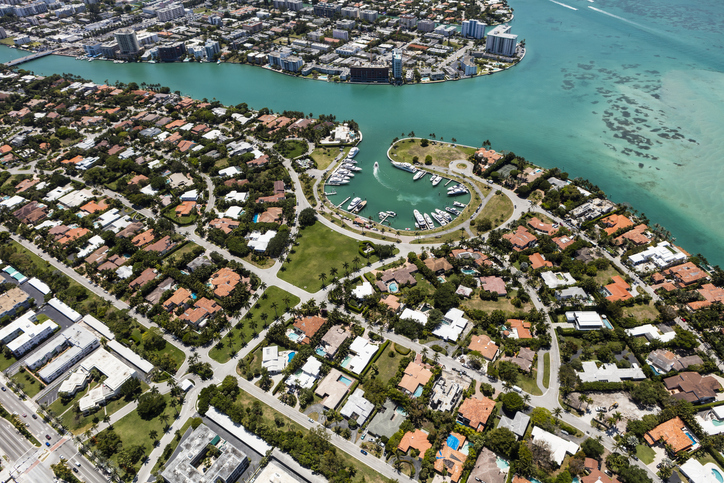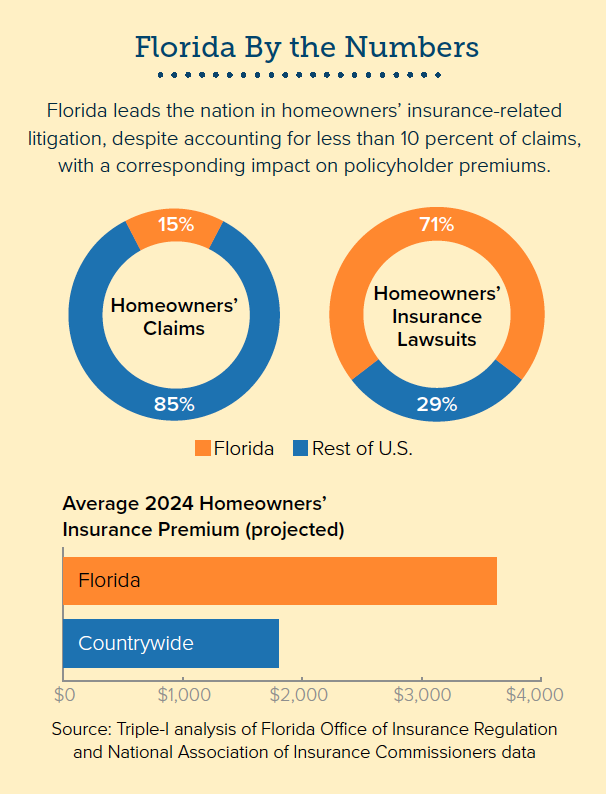
Florida’s legislative reforms to address claim fraud and legal system abuse are stabilizing the state’s property/casualty insurance market, according to the latest Triple-I Issues Brief.
Claims-related litigation has significantly declined over the past two years, and premium averages are nearly flat, with several insurers requesting rate decreases from the state’s insurance regulator. In addition, the brief says, the number of insurers writing business in the state has rebounded after a multi-year exodus. This competition from the private market has allowed policyholders to leave Citizens Property Insurance Corp. – the state-run insurer of last resort – to obtain coverage at previously unavailable rates from a much healthier private market.
According to the state’s Office of Insurance Regulation (OIR), Florida in 2022 accounted for nearly 71 percent of the nation’s homeowners claim-related litigation, despite representing only 15 percent of homeowners insurance claims. The same year – before Hurricane Ian made landfall in Florida – six insurers in the state declared insolvency, primarily due to economic pressures from legal system abuse. Based on insured losses, Ian became the second-most costly U.S. hurricane on record, due in large part to extraordinary litigation costs for disputed claims.
The Legislature responded to the growing crisis by passing several pieces of insurance reform that, among other things, eliminated one-way attorney fees and assignment of benefits (AOB) for property insurance claims and prohibited misleading legal service ads and the misuse of consumer health information for legal services.
Premium rate growth slowing
The impact of the 2022 and 2023 reforms can be seen in premium rate changes, particularly with respect to homeowners insurance. Homeowners rates in Florida grew at a much slower rate in 2024, even as rate growth remained strong nationally. Growth in personal auto insurance premium rates in Florida has slowed since the repeal of AOB and one-way attorney fees, but the trend also is consistent with nationwide experience.
“There are a lot of factors involved in insurance rates, and Florida’s property and auto markets are challenging,” Florida Governor Ron DeSantis said in February, “but…data suggests that, in 2024, Florida had the lowest average homeowners’ premium increases in the nation, and the overall market has stabilized, with 11 new companies having entered the market over the past two years.”
Among the top 10 national insurers writing homeowners insurance in Florida, 60 percent have expanded their business over the past year, and 40 percent of all insurers operating in the state filed for rate decreases in 2024, according to Florida Insurance Commissioner Michael Yaworksy.
The cost of reinsurance also continues to decrease for Florida carriers.
“In 2024, most companies paid less for reinsurance than they did in 2023,” according to the OIR website. “The average risk-adjusted cost for 2024 was -0.7 percent, a large reduction from last year’s change of 27 percent increase from the prior year.”
Reinsurance costs are factored into premium rates, so this is another reason Florida now has the lowest average rate filings in the United States in 2024, according to S&P Global Marketplace.
Learn More:
Florida’s Progress in Legal Reform: A Model for 2025
How Georgia Might Learn From Florida Reforms
Resilience Investments Paid Off in Florida During Hurricane Milton
Florida Homeowners Premium Growth Slows as Reforms Take Hold, Inflation Cools



